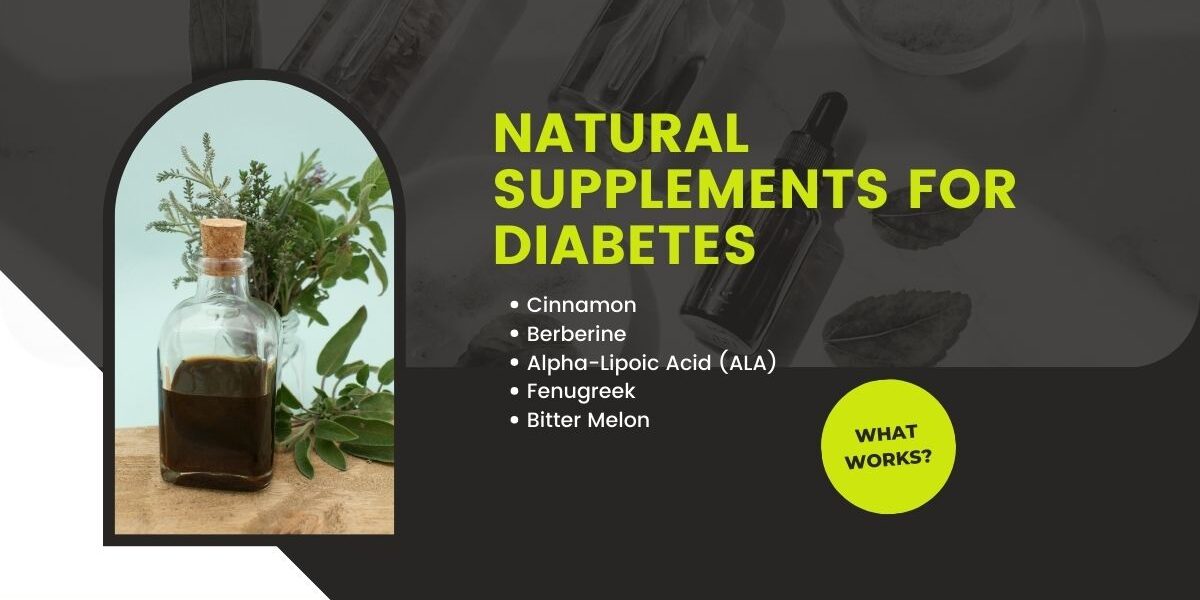Managing diabetes effectively often involves a combination of medication, diet, and lifestyle changes. However, many people also turn to natural supplements in hopes of controlling their blood sugar levels. But do these supplements actually work? In this post, we’ll analyze various natural supplements claimed to help manage diabetes, discussing their efficacy, safety, and the scientific evidence supporting them.
Understanding the Role of Natural Supplements in Diabetes Management
Before diving into specific supplements, it’s important to understand that natural supplements should not replace conventional diabetes treatments. Instead, they may complement your current treatment plan. Always consult with a healthcare provider before starting any new supplement to ensure it’s safe and appropriate for your needs.
1. Cinnamon: A Popular Spice with Potential Benefits
Claim: Cinnamon is one of the most popular natural supplements for diabetes, with claims that it can help lower blood sugar levels by improving insulin sensitivity.
Efficacy: Some studies suggest that cinnamon may reduce fasting blood sugar levels and improve insulin sensitivity, especially in people with type 2 diabetes. However, results are mixed, and more research is needed to confirm these effects.
Safety: Cinnamon is generally safe when consumed in moderate amounts. However, excessive intake, especially of cassia cinnamon (a common variety), can lead to liver damage due to high levels of coumarin.
Scientific Backing: A meta-analysis published in the Journal of Medicinal Food found that cinnamon has a modest effect on fasting blood glucose and cholesterol levels in people with type 2 diabetes. However, the authors noted that larger, more rigorous studies are needed.
2. Berberine: An Ancient Remedy with Modern Potential
Claim: Berberine, a compound found in several plants, including goldenseal and barberry, is claimed to lower blood sugar levels and improve insulin sensitivity.
Efficacy: Berberine has shown promise in several studies, with some research suggesting it can be as effective as metformin, a commonly prescribed diabetes medication. It works by decreasing glucose production in the liver and improving insulin sensitivity.
Safety: While berberine is generally safe, it can cause gastrointestinal side effects in some people, such as diarrhea and constipation. It’s also important to note that berberine can interact with other medications, so consultation with a healthcare provider is essential.
Scientific Backing: A study published in the Journal of Ethnopharmacology found that berberine significantly reduced fasting blood glucose, postprandial blood glucose, and HbA1c levels in people with type 2 diabetes. The study suggests that berberine could be a promising supplement for diabetes management, though more research is needed.
3. Alpha-Lipoic Acid (ALA): A Powerful Antioxidant
Claim: Alpha-lipoic acid (ALA) is an antioxidant that may help lower blood sugar levels and improve insulin sensitivity. It is also touted for its ability to relieve neuropathy (nerve pain) associated with diabetes.
Efficacy: ALA has shown potential in reducing insulin resistance and improving blood sugar control. It’s also effective in treating diabetic neuropathy, with studies showing that it can reduce symptoms such as pain, tingling, and numbness.
Safety: ALA is generally considered safe, but high doses can lead to side effects like nausea and skin rash. People with thyroid conditions should use caution, as ALA can lower levels of thyroid hormones.
Scientific Backing: Research published in Diabetes Care indicates that ALA can reduce symptoms of diabetic neuropathy and improve insulin sensitivity. However, more studies are needed to determine its long-term safety and efficacy.
4. Fenugreek: A Traditional Herb with Modern Applications
Claim: Fenugreek seeds are believed to lower blood sugar levels by slowing carbohydrate absorption and improving insulin sensitivity.
Efficacy: Several studies have shown that fenugreek can help reduce blood sugar levels, particularly after meals. It contains soluble fiber, which may help slow digestion and absorption of carbohydrates.
Safety: Fenugreek is generally safe when used in moderate amounts. However, it can cause side effects such as bloating, gas, and diarrhea in some individuals. People with allergies to peanuts or chickpeas should use caution, as they may also be allergic to fenugreek.
Scientific Backing: A study published in the Journal of Diabetes and Metabolic Disorders found that fenugreek supplementation significantly reduced fasting blood glucose and HbA1c levels in people with type 2 diabetes. The study suggests that fenugreek could be a useful adjunct to diabetes management.
5. Bitter Melon: A Traditional Remedy with Mixed Results
Claim: Bitter melon, a fruit commonly used in Asian cuisine, is believed to lower blood sugar levels and improve glucose tolerance.
Efficacy: Bitter melon has been shown to have blood sugar-lowering effects in some studies. However, the results are inconsistent, and the effects may vary depending on the form and dosage used.
Safety: Bitter melon is generally safe when consumed in food amounts. However, excessive use, particularly in supplement form, can cause gastrointestinal issues and lower blood sugar levels too much, leading to hypoglycemia.
Scientific Backing: A study in the Journal of Ethnopharmacology reported that bitter melon extract had a modest effect on lowering blood sugar levels in people with type 2 diabetes. However, the authors called for more well-designed clinical trials to confirm these findings.
Conclusion: Do Natural Supplements Help with Diabetes?
While some natural supplements show promise in helping manage diabetes, they should be used with caution and under the guidance of a healthcare provider. Supplements like cinnamon, berberine, ALA, fenugreek, and bitter melon may offer benefits, but they are not a substitute for prescribed medications and lifestyle changes. Always consult your doctor before adding any new supplement to your regimen.





